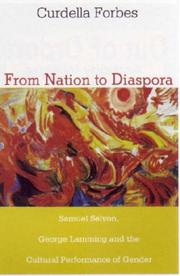| Listing 1 - 3 of 3 |
Sort by
|

ISBN: 9766401713 1435630920 9781435630925 9789766401719 Year: 2005 Publisher: Jamaica : the University of the West Indies Press,
Abstract | Keywords | Export | Availability | Bookmark
 Loading...
Loading...Choose an application
- Reference Manager
- EndNote
- RefWorks (Direct export to RefWorks)
West Indian literature --- Culture in literature. --- Gender identity in literature. --- Masculinity in literature. --- Masculinity (Psychology) in literature --- Caribbean literature --- History and criticism. --- Selvon, Samuel --- Lamming, George, --- Selvon, Sam --- Criticism and interpretation. --- Postcolonialisme --- IDENTITE SEXUELLE --- DIFFERENCES ENTRE SEXES (PSYCHOLOGIE) DANS LA LITTERATURE --- LITTERATURE DE L'INDE DE LANGUE ANGLAISE --- LITTERATURE ANTILLAISE = CARIBBEAN LITERATURE --- HISTOIRE ET CRITIQUE
Book
ISBN: 9766379351 9789766379353 9766378614 9789766378615 Year: 2016 Publisher: Kingston
Abstract | Keywords | Export | Availability | Bookmark
 Loading...
Loading...Choose an application
- Reference Manager
- EndNote
- RefWorks (Direct export to RefWorks)
Creole dialects, English --- English Creole languages --- Negro-English dialects --- In literature. --- Selvon, Samuel --- Selvon, Sam --- Criticism and interpretation. --- Trinidad and Tobago --- Republic of Trinidad and Tobago --- República de Trinidad y Tobago --- Torinidaddo Tobago --- Torinidādo Tobago --- Trinidad & Tobago --- Trinidad ja Tobago --- Trinidad och Tobago --- Trinidad-Tobago --- Ṭrinidad ṿe-Ṭobago --- Trinidad y Tobago --- Trinité-et-Tobago --- טרינידד וטובגו --- トリニダッド・トバゴ --- トリニダード・トバゴ --- Tobago (Colony) --- Trinidad --- West Indies (Federation) --- In literature --- History and criticism.
Book
ISBN: 9780803243989 0803243987 0803280785 9780803280786 9780803280762 0803280769 9780803280779 0803280777 Year: 2015 Publisher: Lincoln : Baltimore, Md. : University of Nebraska Press, Project MUSE,
Abstract | Keywords | Export | Availability | Bookmark
 Loading...
Loading...Choose an application
- Reference Manager
- EndNote
- RefWorks (Direct export to RefWorks)
"Storyworlds," mental models of context and environment within which characters function, is a concept used to describe what happens in narrative. Narratologists agree that the concept of storyworlds best captures the ecology of narrative interpretation by allowing a fuller appreciation of the organization of both space and time, by recognizing reading as a process that encourages readers to compare the world of a text to other possible worlds, and by highlighting the power of narrative to immerse readers in new and unfamiliar environments.Focusing on the work of writers from Trinidad and Nigeria, such as Sam Selvon and Ben Okri, The Storyworld Accord investigates and compares the storyworlds of nonrealist and postmodern postcolonial texts to show how such narratives grapple with the often-collapsed concerns of subjectivity, representation, and environment, bringing together these narratological and ecocritical concerns via a mode that Erin James calls econarratology. Arguing that postcolonial ecocriticism, like ecocritical studies, has tended to neglect imaginative representations of the environment in postcolonial literatures, James suggests that readings of storyworlds in postcolonial texts helps narrative theorists and ecocritics better consider the ways in which culture, ideologies, and social and environmental issues are articulated in narrative forms and structures, while also helping postcolonial scholars more fully consider the environment alongside issues of political subjectivity and sovereignty.
Caribbean literature (English) --- African literature (English) --- Postcolonialism in literature. --- Ecocriticism. --- Ecological literary criticism --- Environmental literary criticism --- Criticism --- History and criticism. --- Selvon, Samuel --- Saro-Wiwa, Ken, --- Naipaul, V. S. --- Okri, Ben --- Okri, Benjamin --- Selvon, Sam --- Criticism and interpretation. --- Postcolonialism in literature --- Ecocriticism --- History and criticism --- Criticism and interpretation --- African literature (English). --- Caribbean literature (English). --- Englisch. --- Erzähltechnik. --- Postkolonialismus. --- Roman. --- Okri, Ben. --- Selvon, Samuel. --- Nigeria. --- Trinidad. --- Caribbean literature (English) - History and criticism --- African literature (English) - History and criticism --- Selvon, Samuel - Criticism and interpretation --- Saro-Wiwa, Ken, - 1941-1995 - Criticism and interpretation --- Naipaul, V. S. - (Vidiadhar Surajprasad), - 1932-2018 - Criticism and interpretation --- Okri, Ben - Criticism and interpretation --- Saro-Wiwa, Ken, - 1941-1995 --- Naipaul, V. S. - (Vidiadhar Surajprasad), - 1932-2018
| Listing 1 - 3 of 3 |
Sort by
|

 Search
Search Feedback
Feedback About
About Help
Help News
News